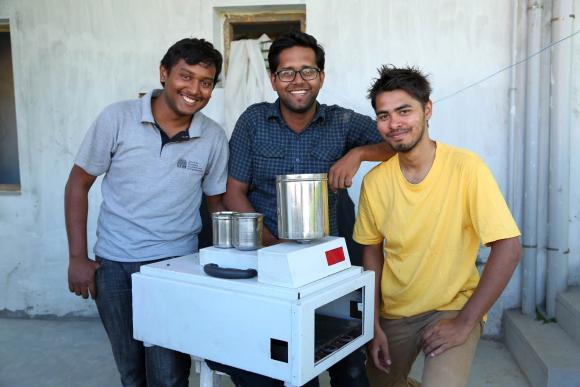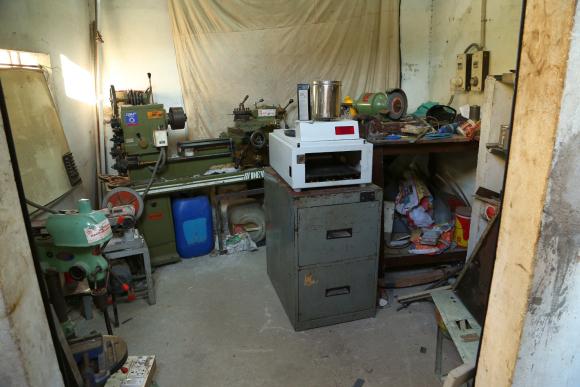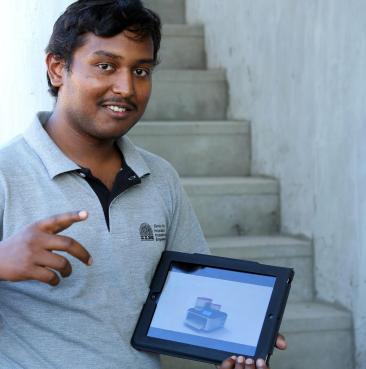Photographs: Sreeram Selvaraj Shobha Warrier
Eshwar K Vikas, who has made a dosa machine and patented it speaks with Shobha Warrier about the odds he faced in his entrepreneurial journey and the road ahead.
Though his father was a bank officer, Eshwar K Vikas, a final year engineering student at the SRM University in Chennai always wanted to be "on his own" and start his own company. The only explanation he has for this dream is, "maybe it is in my genes as we are vysyas and all the other family members are into some business or the other."
When teachers asked the students in school, 'what do you want to become', he used to say, 'a businessman.'
"At that time, the word entrepreneur was not known to me. By the time I was in my 11th, I started reading about entrepreneurship and I decided then that I would be an entrepreneur."
The entrepreneur Eshwar was fascinated about was Captain Gopinath. "When I was in the 12th, I read his book Simply Fly and after that, I had no doubt about who I wanted to be -- an entrepreneur. His story made me realise that I did not have to be a businessman's son to be an entrepreneur."
Eshwar had planned to be an engineer first, take an MBA degree next and then become an entrepreneur. It appears he didn't have the patience to wait that long.
First influence
What changed his life was an event his college conducted on entrepreneurship awareness when he was in the first semester. Raj Shankar, who did consultancy services for small businesses, was one of the guest speakers.
When Eshwar walked up to him with a business idea at the end of the presentation, he was asked to meet him at his office. "I went to his office with a friend of mine, and he listened to us patiently. We gave an idea about a placement website which companies could use and recruit people. Soon, eight of my friends started working on the idea but after two months, I was the only one left!"
That was when Eshwar realised that he needed some experience in a company to start something on his own. So, he decided to do an internship with Raj Shankar's company while studying.
After classes were over at four o'clock in the afternoon, he used to travel for two hours to the office and work there. He got involved in many events on entrepreneurship the company conducted at many places.
First taste of entrepreneurship
Image: The dosa machinePhotographs: Sreeram Selvaraj
His first stint as an entrepreneur was starting a food stall selling vada pav and jal jeera at the cultural fest in his college. "We didn't have the capital to have a stall. So, six of us pooled in Rs 50 each and printed posters in black and white saying we would sell vada pav at the fest and if students booked in advance, they could get them for a discounted price of Rs 8. We then went to classes and sold tokens for 1000 vada pav and collected Rs 8000. Then we went and told the college authorities that we had already sold tokens and we were in need of a stall. Though they refused first saying 'no stalls for students', they later gave us a free stall seeing our enthusiasm."
They had huge sales for three days and Eshwar and group made a profit of Rs 20,000! That was his first entrepreneurial venture as a 17 year old.
Internship to get experience
Before he started his own business, to gain more experience, even while studying, he decided to work with the Amar Group of industries after college hours. "When I told the CEO, I didn't want any salary, he said, "I will give you a nominal salary; you work as my executive assistant". His office was at the Industrial Estate at Ambathur. He used to send me to Hyderabad for marketing during weekends. After that, more travels to many more places..."
Life was tough for the youngster working after college and he had only 4 to 5 hours of sleep every day. "I was not a college topper but I used to score 70-75 per cent which was quite good."
A dosa machine
Image: Eeshwar K VikasPhotographs: Sreeram Selvaraj
That was when he decided that whenever he started a business, it would have something to do with food. "I am a foodie who loves Indian vegetarian food. The success of vada pav made me decide that that was where I was going to work in future."
When he was in the 3rd year, he conceptualised a small machine that would "print food like the printer does." And dosa was his obvious choice. "Dosa is loved by all and it is difficult to make a good, crisp, tasty dosa unlike idli."
When he suggested the idea to the CEO of Amar group, he gave the factory premises at the Industrialist estate to experiment on the machine. Eshwar along with his friend Sudeep Sabat started working on a machi#8800 though both of them were studying electrical engineering.
"To design the machine, I observed how a dosa is made. You disperse batter, spread it, apply oil on it and when crisp, remove it from the tawa. After that, clean the tawa with water. I wanted the machine to do all this."
He started work on the machine with Rs 70,000 he had saved while working as an intern with the Amar group. He thought he could make the machine in about Rs 50,000 but the budget went up. Then his college, SRM Engineering, sponsored his work by giving Rs 1,20,000.
After college hours, both the friends used to go to the factory and work with the factory workers on the prototype, till the place closed at 7pm. "It was not a romantic experience making the machine. We were travelling a lot, and working really hard with very little sleep. Because we worked with the machines in the factory, our dresses used to get dirty and since we stayed in the hostel, we had to wash them ourselves. By the time we came back, the mess would be closed and we had to make our own food. We survived on Maggi noodles. Those were tough days. We only had two things in our lives, attending college and working on the dosa machine."
First dosa, a disaster
After three months, the machine was ready and all the factory workers at Amar group were eager to see how a machine made dosa. "It was a disaster and the factory workers said, come on, you guys will never make it!"
The workers believed that the machine would never work and lost interest in the project. The long hours of travel was also taking a toll on their health. So they decided to shift their project to a place near the college. Luckily, for them, the redesigned machine soon started making good dosas and it took less than a minute for the machine to make a dosa.
Selling machine dosas
Photographs: Sreeram Selvaraj
Eshwar found a street side vendor selling idlis and made a deal with him; that he and his friends would make dosas with the machine and he would sell them.
The machine made 5 dosas first and all the five dosas got sold in a jiffy. "We were very happy. We were not making any money but we were happy people bought the dosas made from our machine and they liked them. The customers didn't know the dosas were made by a machine. But the problem was, only we knew how to operate the machine. Now, we knew what could be done to make it commercially viable."
Then he came to know that the Central Food Technological Research Institute (CFTRI), Mysore, has already produced an automated dosa machine. "But it was huge and what we had in mind was a small one, like a normal microwave oven."
Getting a prize for innovation
In 2012, at an international competition at the National Institute of Technology (NIT) Trichy, where students from 16 countries participated, the dosa machine was selected for the first prize in the innovation category. The result: Indian Angel Networks came forward to incubate the company. They also got a mentor in Hari Balasubramaniam.
Starting a private limited company
After incubation, Eshwar along with Sudeep Sabat and Sudarshan Lodha started a Private Ltd company, Mukunda Foods Pvt. Ltd. and registered it in May, 2012. By August, the new small machine, which is 10 per cent bigger than the standard microwave oven, priced at Rs 1 lakh, was ready. Eshwar is confident that once he starts manufacturing in bulk, he will be able to sell each machine at Rs 15-20,000.
He has also patented the dosa machine. Two more people -- Prashant Doshi and Alistair Drozario -- have joined them as full time associates.
At an event at IIT, Madras, they were chosen for the best start-up award in the country.
Plans for the future
When they met and demonstrated their machine at many hotels and restaurants, they found the response from the industry was "quite fantastic."
"Out of the 100 people we spoke to, 60 showed keen interest in the dosa machine. Industry feedback has been very encouraging. We are told that not only in India but internationally also, there is a market for this. Everyday, we get 10-15 enquiries... Some people want to start mobile dosa eateries like the ice cream carts."
Before taking any orders, Eshwar and his partners want to take the company to next level, and for that, they are trying to raise funds. Eshwar has realised that angel investors are not yet ready to invest in a manufacturing product company; they prefer software companies.
Eshwar has already charted out plans for the future, "Once we get the funds, we will start manufacturing and enter the market. In the first six months, we will go slow with around 200 machines and after that, we will scale up. We are sure that we will be able to sell our dosa machine in thousands"





Comment
article